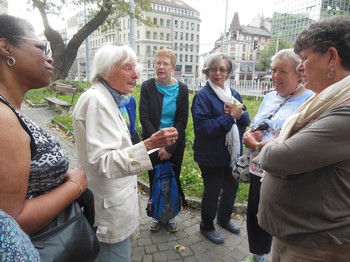The following article was originally printed in the March/April 2016 issue, "The complete guide to youth ministry," of Presbyterians Today.
The year 2009 marked the 500th anniversary of John Calvin’s birth, an occasion celebrated by Reformed churches around the world. For Kathy Reeves, mission associate for Presbyterian Women, the theologian’s birthday also sparked an idea for an international study tour about women during the Reformation.
“It occurred to me that people don’t pay much attention to how women participated in the Reformation,” Reeves says.
Reeves wanted to bring that history to life—particularly the history of French Huguenots who were persecuted for their faith for more than a century. “I also wanted women to claim persecution as a part of our Reformed heritage,” she says. “So many Christians have been persecuted and continue to be persecuted because of their faith. American Christians don’t really know much about that.”
So, in 2009, Reeves coordinated an ecumenical tour of Geneva, Switzerland, and parts of southern France to inspire transformative leaders among the tour’s participants. In 2010 and then again in 2013 and 2014, Mary Jorgenson, the then moderator of Presbyterian Women, led the 10-day tour, with me along as translator.
Today, it’s hard to trace the mark of Reformation-era women—whose faces don’t appear on the Reformation Wall in central Geneva. In a cosmopolitan city that’s home to an office of the United Nations and the International Committee of the Red Cross, the Presbyterian Women groups trekked through Geneva’s hilly, cobblestoned streets to follow in the footsteps of Calvin and his colleagues. There, they learned the story of a woman named Marie Dentière, who recorded much of what we know now about life in Geneva during Calvin’s lifetime. Then they traveled to southern France, where the groups visited the Tour de Constance in Aigues-Mortes, where Protestant women were held prisoner in the 17th century when they refused to renounce their faith.
Each year the trip coincided with the Reformed Church of France’s annual worship service in the wilderness outside Anduze in southern France. The outdoor church service commemorates a century during which Protestant faith was illegal, punishable by imprisonment or exile. Those who chose to continue to practice their faith had to do so in private or far from the long arm of the law in a wilderness that the French Protestants likened to the desert of Exodus.
Sharon Cely, who went on the trip in 2013, says that for her, the trip was a hands-on way to learn the history of her faith. “It was interesting to see how the everyday experiences of church have evolved,” she says. “Would I be as loyal to my faith, to stay true, while being persecuted?”
In 2010, the group visited an order of Protestant nuns who, inspired by their own history of persecution, helped shelter Jews during World War II. The group also spent a morning in Nice, at the regional offices of a volunteer-run nonprofit organization called La Cimade, which formed in the 1940s in response to the detention of German-speaking Protestants in Alsace-Lorraine.
“The overwhelming faith and hope throughout all the persecution and imprisonment are still palpable in those sacred spaces,” says Marilynn Collins, who went on the trip in 2013.
Each year the tour group—comprised of women from all over the United States—spent a morning at the Ecumenical Center in Geneva, talking with Presbyterian clergy and with Fulata Moyo, the World Council of Churches’ program executive for women in church and society. Judith Ward, who went on the trip in 2014, says that the time at the Ecumenical Center illustrated the connection between past and present work. “We are continuing what our sisters of faith began so many years ago,” she says. “We’re continuing to help define Christianity and the church.”
Judith Klamm, who went on the trip in 2010, fondly remembers how deeply participants bonded during the 10 days in Europe. “The lasting memory is the great camaraderie with other Presbyterian women as we explored together an important piece of our common history,” she says.
“Being on this trip humanized church leadership for me,” says Anne Bauer, who went on the trip in 2014. “In the prisons in France, I pictured the suffering of the believers, making them real. And during our meals together, other Presbyterian women spoke of their trials and successes leading the church today, making for an interesting interplay between then and now.”
For many of the trip participants, an outdoor service was the most moving part of the tour. Gathered under trees in the French countryside with thousands of French counterparts, the American women hummed along with hymns they recognized and took Communion, blessed in words they did not know but in a spirit they understood.
Hillary Moses Mohaupt is a writer and photographer. She lives in Philadelphia.

